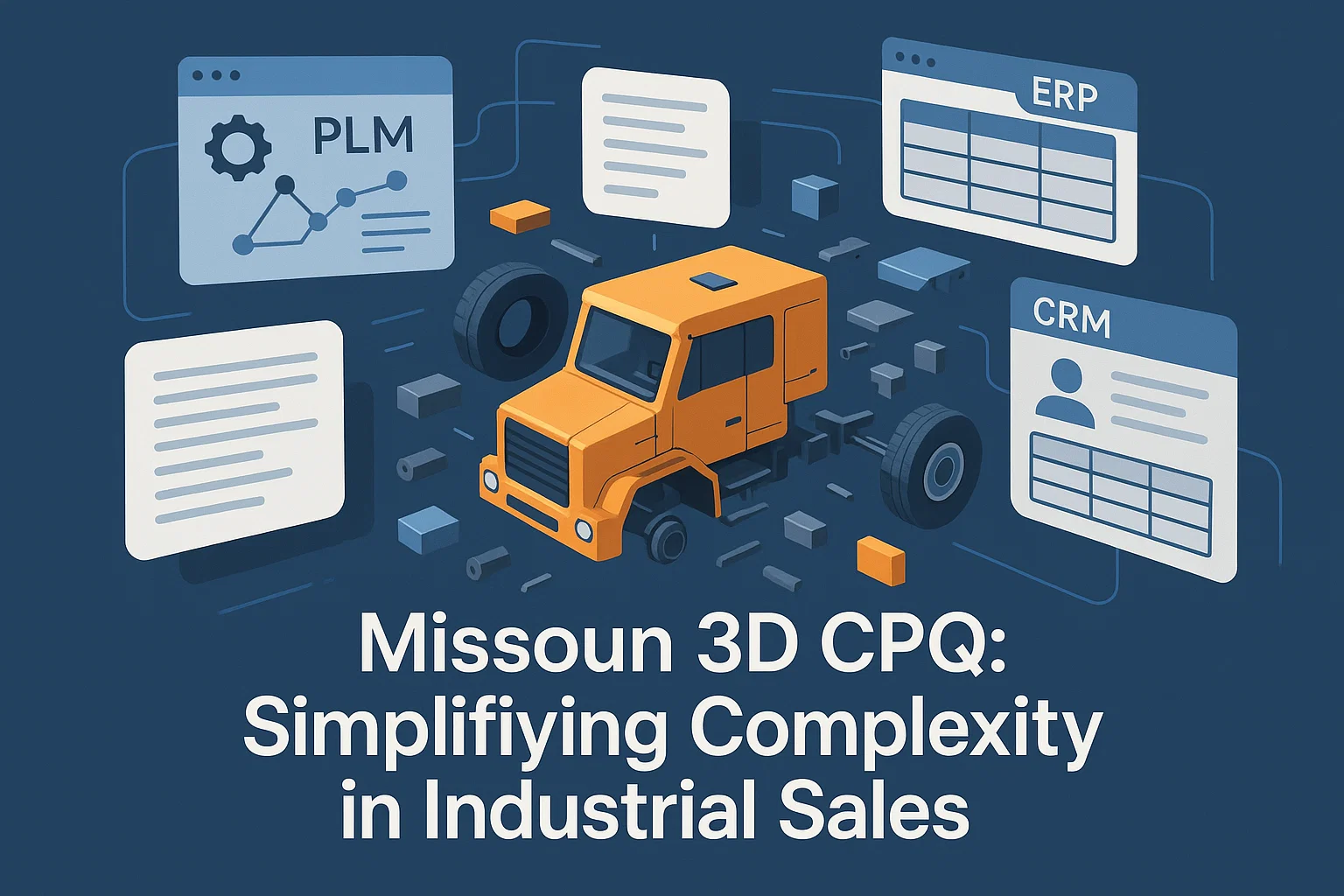All Posts
The Hidden Challenges of CPQ Implementation for Manufacturers of Complex Products

At Missoun, we work closely with manufacturers facing some of the toughest challenges in CPQ: highly configurable products, extensive product portfolios, and organizations shaped by years of growth, mergers, and acquisitions.
From our experience with companies in automotive, heavy vehicles, and industrial equipment, we’ve seen how the complexity of products, pricing, and processes can turn CPQ implementation into a high-stakes digital transformation initiative.
This article explores the real issues that arise when deploying a CPQ system—especially for manufacturers managing:
- Multiple brands and disconnected systems
- Non-standard, regionalized pricing
- Fragmented data across PLM, ERP, and CRM
- A gap between engineering and sales workflows
If your company designs and sells complex, configurable products, these challenges will likely resonate.
1. Multiple Brands and Product Lines: A Tower of Babel
When manufacturers expand through acquisitions, they inherit more than new products—they also take on legacy systems, inconsistent configuration logic, and incompatible data structures.
Each brand may define models, BOMs, and options differently. One uses feature-based configuration; another relies on revision codes or exclusions. Even basic concepts like “variant” or “color” may be interpreted differently.
This fragmentation makes it costly and time-consuming to consolidate logic into a single CPQ system, leading to delays in implementation and potential risks in application maintenance.
2. Non-Standard Pricing Models: A Recipe for Inconsistency
Pricing in industrial B2B sales is rarely simple. It varies based on:
- Customer type (OEM, distributor, end-user)
- Geography, taxes, and local market strategies
- Volume-based discounts, promotions, or negotiated terms
Often, pricing is stored in spreadsheets or controlled manually by sales teams. That creates a major obstacle when attempting to implement a centralized CPQ pricing engine—especially one that’s expected to serve multiple brands and countries.
Without harmonization, the result is pricing errors, limited transparency, and reduced control over margins.
3. Fragmented Data Landscape: When Information Becomes a Liability
Complex manufacturers often store product and sales data across:
- PLM systems for product definitions
- ERP systems for operations, pricing, and inventory
- CRM systems for customer and quote tracking
- Excel sheets or scripts that "bridge the gaps"
After mergers or system migrations, these silos multiply. A CPQ system must unify these disparate sources into a reliable, synchronized foundation—or risk becoming yet another silo.
Failing to resolve this leads to outdated configuration rules, broken workflows, and inaccurate quotes.
4. Lack of Integration with Engineering: The Disconnect Between E-BOM and S-BOM
A common blind spot in CPQ initiatives is the disconnect between engineering and sales. Engineering manages the E-BOM (Engineering Bill of Materials); sales relies on a customer-facing S-BOM (Sales BOM).
Without integration, sales teams must recreate configuration logic manually, resulting in:
- Duplicated rule management
- Misalignment between sales and manufacturing
- Delays in propagating engineering changes
A future-proof CPQ should integrate directly with PLM systems to ensure that engineering data flows cleanly into the sales process.
5. PLM and ERP Interoperability: The Missing Links
For CPQ to function as part of the end-to-end enterprise architecture, it must integrate with both PLM and ERP platforms.
Disconnected CPQ systems lead to:
- Manual data entry from quote to order
- BOM misalignment in production planning
- Slower lead times and increased risk of errors
For manufacturers running on SAP, Oracle, or Siemens Teamcenter, it's essential that CPQ be deeply integrated.
The Missoun Platform: Built for Industrial CPQ at Scale
Missoun is a cloud-native CPQ and 3D configurator platform specifically for manufacturers of complex products. Our solution is designed to serve as a modern sales infrastructure—integrated, scalable, and user-friendly across global dealer and sales networks.
We're proud to be a technology partner of Siemens Digital Industries, and our CPQ platform is officially offered by Siemens to their customers, with direct integration to Teamcenter Product Configurator. This makes it an ideal fit for companies using the Siemens configurator to manage their product definition and rules. If needed by the customer, the same logic applies to other PLM applications as well.
What Sets Missoun Apart:
- Built on Mendix low-code: Rapidly extend and deploy new features and apps without traditional dev cycles
- Direct PLM integration: Reuse engineering data from Teamcenter, no data duplication
- Full API and connector suite: Seamless ERP, CRM, and legacy system integration
- Empower your teams: Business users can build apps and workflows without code
Whether you're launching a truck configurator, an industrial equipment CPQ, or a 3D product configurator for a global portfolio, Missoun delivers a platform that lowers cost, accelerates time to market, and ensures long-term flexibility.
Turn Configuration Complexity Into Sales Velocity
If you're facing the challenges of fragmented data, inconsistent pricing, or multi-brand complexity, Missoun can help.
Let’s build a CPQ system that works for your products—and your people.
Get in touch to book a demo or explore a pilot project.




